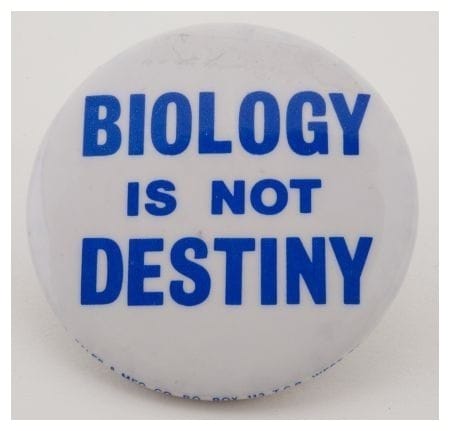Trans: a book about us, without us
So far no mainstream newspaper has been brave enough to commission a trans reviewer
In the introduction to her book “Trans”, Helen Joyce boldly asserts:
“This is not a book about trans people. I will present the scientific research into what causes gender dysphoria and cross-sex identification. But I will not seek to balance stories of those for whom transition has been a success, and those for whom it has been a failure. Whether or not transition makes people happier is an important question for individuals and clinicians, especially when it involves irreversible hormonal or surgical interventions. But it is irrelevant to evaluating the truth of gender-identity ideology, and to whether self-declared gender should replace sex across society. To draw another analogy, whether a religion makes its believers happy is irrelevant to the question of whether its god exists, or whether everyone else should be compelled to pay it lip service.”
The only sense in which this is true of course, is the sense in which it is possible to depersonalise, and even dehumanise trans people as the subjects of a book which covers (by chapter, and I am not claiming it covers any of these topics well):
- Trans history (covering roughly the 20th Century)
- Trans sexuality (from the point of view of a particularly perverse and discredited psychosexologist from Toronto)
- Trans influences on popular culture and understandings of sex.
- Trans children (from the perspective of a fringe of psychology politically opposed to trans people’s own subjectivity)
- People who used to but no longer identify as trans (with a distinct focus towards those who have taken up campaigning roles against transition, while ignoring the growing number of former detransitioners).
- The corrupting influence of trans people’s beliefs and arguments on the youth(!)
- The threat that trans rights activism poses to women in general(!)
- Admittedly a detour on the importance of single-sex spaces for women which is not mostly focused on trans people (although the context here is that it is providing a rationalisation for why trans people must be excluded from these spaces)
- Trans women as eroding women’s sports (since the book was published none of the trans women who competed as women in the Olympics won so much as a podium place — better luck next time girls!)
- Trans rights advocacy as part of a red menace.
- Disturbingly, this chapter covers “the money behind” trans activism and tries to portray trans rights acceptance and policy reforms as a largely the product of the influence of shady Transhuman Billionaires (did I just hear dogs barking?) operating sneaky influence campaigns behind the scenes and pulling strings as part of an effort to hide paedophiles.
- Trans activism a threat to civil society and trans rights reforms as being at odds with the most vulnerable and poor in society including trans people themselves.
- “They can’t fire us all” — the second chapter to be focused on a group other than trans people and the last before the conclusion.

If we accept for the sake of argument Helen Joyce’s claim that this is not a book about trans people, we are obliged nevertheless to understand her book as addressing The Transgender Question —the question of how are trans people to be understood and accommodated (or not) in society. That Joyce spends so much time laying out her model of what “Transgender” or “gender-identity” ideology is without really citing any ideologues who may claim such an ideology is a good match to her disinterest (expressed in the introduction) towards trans self knowledge, awareness, or experiences as having any value whatsoever when it comes to evaluating the “truth” of that ideology ascribed to us. As a demographic, as a civil rights movement, as activists and in any other role where we interact with cis people.
It’s a bitter irony that (contrary to the years of government consultations and productive collaborations involving both trans and women’s organisations over the last 2 decades and more) the great refrain of the Gender Critical movement has been “women weren’t asked”, and yet in both the press and in Joyce’s book there is no room for trans thought.
So far in the British press, the Telegraph, the Evening Standard, The Times, The Daily Mail, and The Scotsman have each published a glowing review of the book, gushing about the terrifying Trans threat, with sensationalistic headlines like “Toddlers transitioning, male rapists in women’s prisons: this is the book you need to read about trans activism” (5 stars out of 5). The Guardian opted instead for Gaby Hinsliff’s lukewarm perspective on the book in a double-barrelled review with Kathleen Stock’s trans question opus, suggesting that the latter might be the better of the two. Not a single one of these publications — between them comprising the broad majority of serious mainstream newspapers in the UK — has considered commissioning a trans person to review this book.
When I commented about this on twitter, the replies from several people were “well you can write on medium can’t you?” as if the issue was one of being able to say what I (or other trans people) think, rather than a matter of the systematic suppression of trans voices within the wider mainstream conversation about our human rights.
I’ll put this bluntly:The British media writes about trans people at length while suppressing our ability to talk back. Being trans in this country is like having loudspeakers on every street corner demanding submission to the regime ideology while we do our best to have conversations among ourselves.
I recognise that we are a tiny minority. It would be understandable for trans people to have a small proportionate voice in relation to the non-transgender population. But we rarely even have that, and the media are to be frank about it, quite obsessed with “the trans debate”.
What “trans debate”? The debate where there is on the one hand cis man Owen Jones occasionally stepping up to speak on our behalf (without any real accountability to us one way or another for better or worse), and then the rest of the time any of dozens of journalists making a career out of immiserating our community? Either way we are, for practical purposes, silenced by the British media. Not in a Suzanne Moore way where that means a move to a different paper where the right wing appreciate your reactionary views more, or a Julie Bindel way where you get a book deal out of it, but in a way where we simply aren’t allowed to talk back in this “debate” cisgender people profess to want so much. We are silenced in the sense of being unspeakable, beyond the pale of acceptability for serious publications, bad, mad and dangerous to be connected to the sinister and corrupting but somehow universally pervasive influence of.


